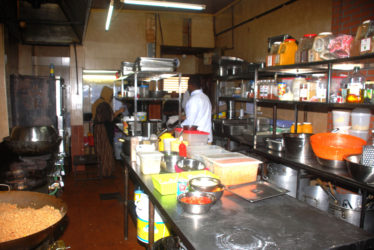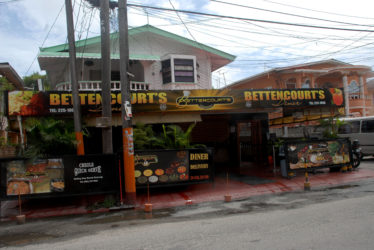A year after closing the doors of its most recently established restaurant that had operated on the ground floor of the Opus Hotel on Croal Street, the popular Bettencourt food service chain is preparing to launch a multi-million-dollar complex that will accommodate a restaurant, conference facilities and a banqueting suite, General Manager John Reman disclosed to Stabroek Business earlier this week.
While Reman declined to provide specifics on costs he disclosed that construction of the first floor of the complex, which will house the restaurant, is likely to begin by July this year and conclude by year end. The location is D’Urban Street, Werk-en-Rust.

Reman said the decision to embark on a major new project, having closed the doors of the company’s Croal Street establishment, was a reflection of the entity’s enduring confidence in the country’s food service sector. He explained that the decision to close the doors of the Croal Street restaurant had been a “strategic” one resulting from a gradual drying up of patronage. “We were forced to make that decision after we discovered that our other branches were subsidizing it,” he said. The other branches are located on D’Urban Street, Brickdam and Stabroek.
Reman was quick to add, however, that the Croal Street closure was not an indication of a waning enthusiasm for the food service sector. “That is certainly not the case. Our business is four generations old,” he said, adding that the decision on a new, costly investment was an indication of the family’s abiding faith in the sector.
And despite the closure of the Croal Street facility Reman struck an upbeat posture when asked about the company’s performance in the sector. He said that while there had been a slump in demand in the 2016 post-independence anniversary period, the strategic changes which Bettencourt’s had made had meant that the entity had landed on its feet. He explained that in the case of the Croal Street restaurant it was simply a question of Croal Street “going dead.” He said the assessment of management had been that the location was simply not an area where people gathered, apart from which “some security challenges arose.”

And according to Reman, the decision to invest in a multi-storey complex was the outcome of the establishment’s assessment of the evolving needs of the service sector. The company, he said, had also decided to reduce its reliance on walk-in customers at its Werk-en-Rust establishment and move further in the direction of taking its services to the corporate community. “Once we discovered that we had the equipment and the skills to respond to the demands of the corporate community we accepted the challenge. Of course we understood that we were being tested. “The infrastructure is there and that is a huge advantage,” Reman said.
Reman, meanwhile, is calling for the creation of a Guyana Culinary Association, a facility which he said can bring the food service sector together to pursue initiatives in its collective interest. “A point has been reached where we need to bridge the gap between local standards and international standards. We need to keep in touch with what is happening beyond Guyana,” he stated.
Not least among his disappointments, he said was the fact that Guyana was yet to establish a culinary school to provide training for the sector. “We have Carnegie and that’s about it,” he said. Reman said there was also a need for a significant local investment in an establishment of businesses that provides the sector with high-quality inventory.





